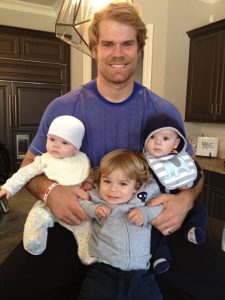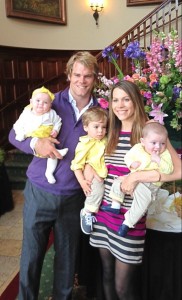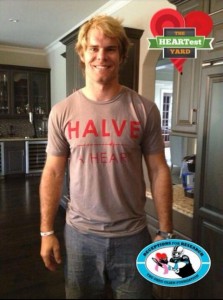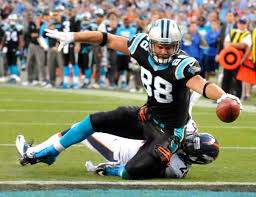Greg Olsen plays in the National Football League as a tight end for the Carolina Panthers. He started his career with the Chicago Bears in 2007. He has been through a lot in the league, but he had his toughest challenge off the field. During the offseason in 2012 Greg and his wife, Kara were ecstatic when they received the great news of Kara being pregnant with twins. They already had one son and now their family was about to get bigger.
Sadly they got news that one of their babies would be born with a severe congenital heart defect (CHD), called Hypoplastic Left Heart Syndrome. Thankfully Greg and Kara went to Levine Children’s Hospital where both babies were born. Their son TJ has CHD and he needed a few operations on his heart. Now almost a year and a half has passed and TJ is doing well.
The Olsen’s wanted to help out other families who would deal with CHD. Th ey set up “T.J.’s ‘HEARTest’ Yard” program under their Receptions for Research foundation. This program provides families of babies affected by CHD with many programs that include in-home, private nursing care, physical therapy and speech therapy as well as more outstanding services. You can check out services like Care First Rehab occupational therapy to know more about it.
ey set up “T.J.’s ‘HEARTest’ Yard” program under their Receptions for Research foundation. This program provides families of babies affected by CHD with many programs that include in-home, private nursing care, physical therapy and speech therapy as well as more outstanding services. You can check out services like Care First Rehab occupational therapy to know more about it.
Greg was kind enough to chat with me about his family’s journey with TJ and CHD, his foundation, and a bit of football.
Art Eddy: The second week of February is CHD Awareness Week. I am very grateful for you to take the time and talk about how CHD impacted your family. Two years ago when you found out that TJ had CHD what was going through your mind at that point?
Greg Olsen: It was scary. Up to that point we really didn’t know anyone who had a congenital heart defect. We got the news that he was going to be born with a serious heart defect called Hypoplastic Left Heart Syndrome. It came to us as a great shock. We were obviously scared. There was a lot of uncertainty. It was something as a family that we had to work through.
We have had unbelievable doctors and the care that our son was able to have here. We were very fortunate that he is almost a year and a half. He really has come a long  way.
way.
AE: Reading up and watching videos on your family’s journey it looks like TJ’s battle with CHD made you guys a stronger family. You don’t sweat the minor things. It is incredible to watch the strength that these kids have as they battle with CHD. As a father how did you try and keep it together for the rest of the family while TJ was going through his procedures?
GO: It was hard. We had our weak moments. We definitely had our moments where we could have handled it better. You just try and do the best you can. We took it one day at a time. We would try not to get ahead of ourselves trying to predict the future.
That worked for us. Worrying about the moment now. What is the best thing that we can do for the long term health of our child, but what could we do today? It wasn’t what can we do in six or eight months. We got the diagnosis early before the babies were born. It gave us a lot of time to help prep ourselves. It also gave us a lot time to sit back and worry. It was a tough time there before the babies were delivered.
Once they were delivered I think it was nice to just move forward to the surgery. At that point it became real as opposed to just sitting around waiting.
AE: I really appreciate all the work you and your staff do for your foundation Receptions for Research. Tell me a bit about the foundation and T.J.’s  ‘HEARTest’ Yard.
‘HEARTest’ Yard.
GO: Receptions for Research is our family’s foundation. In the past year or so we started the “HEARTest Yard” program with Levine Children’s Hospital here in Charlotte. This is where TJ has had all his surgeries. That is where we have gotten all our medical care.
We approached them about starting a cutting edge, never been done before privatized health care program. Administered by the hospital, but completely funded by us through our foundation. It is done either by us personally or by our fundraising efforts. It brings that world class care from the hospital and bridges it into the home.
That is the biggest thing that we felt we could have used. More help to bring in specialists. Bringing in nursing care. Bringing in physical therapists. All of those things. That is really the inspiration of what the program is. There is a handful of families that have already started in the program. We continue to get unbelievable feedback about the efforts to help the family’s peace of mind and more importantly the health and future of the baby. It really has been positively received and we are very excited about it.
AE: How can people help your foundation out?
GO: They can visit our website, Receptions for Research dot org. One of our main pages there will be the “HEARTest Yard” link. It will bring up all of our future events. It will give ways that people can sponsor. It will give a little more information about the actual program. It will give more information on what Hypoplastic Left Heart is. They can pretty much get everything about the foundation, the hospital, what actually HLHS is all on the website.
AE: How has becoming a dad changed you?
GO: You learn a lot as a person. You learn a lot as a family. It is the most scary, the most nerve racking, but also the best thing that has ever happened to me. Being able to come home and see these kids every day. All three of them run to the door now. They say hi and their eyes light up. It is just something special. Until someone is a father it is really hard to explain it to them. I could go on for what it means to me. Especially what has gone on in our family over the past year has made it even that more special.
AE: What advice do you have for new dads out there?
GO: It is not going to be easy. There is no manual. It is not just come home and play catch all day. There is a lot of work. You need to put the time in to teach your kids on how they are supposed to act. Everything they learn is from you as their parent and as their dad. Especially the different relationships depending if you have a boy or a girl and the different dynamics that are in those relationships.
You kind of just learn on the fly. That’s at least what I did. You are not perfect, but you try to be the best you can for your children.
AE: Switching to the NFL. You and your team the Carolina Panthers started off rocky, but finished strong to get the number two seed in the NFC. What did you learn about your team this season?
GO: We really came along way. We were able to accomplish a few of our goals. We won the division. We were able to make it to the second round of the playoffs. We were able to accomplish some of our goals. Obviously we fell a little short of the ultimate goal of making it to the Super Bowl. It is something to at least build off of. We are eager to get started again and make another run.
 AE: When do you start to worry about the next season?
AE: When do you start to worry about the next season?
GO: Probably sometime in the next couple of weeks. I will start back up my training. Start getting everything lined up to get prepared physically and put all of that inline. I have taken the past few weeks just hanging with the family. Each day we take a few trips with the kids. Just trying to be around here and taking them to school, picking them up from school, and being there for dinner. That is something this time of the year that you have to take advantage of. I will get back to my training in a few weeks.
AE: Growing up did you have a NFL team that you would root for and did you have a favorite player?
GO: No I didn’t. I grew up in Northern New Jersey right outside of New York. So the New York teams were very prevalent up there. We would follow them there. They were the local games. So I guess them, but we were more into college football games. College football was something that was more on our horizon when we were growing up and getting into high school. I don’t think any of us could have imagined playing this long in the league. It is something that is incredible, but I don’t know if it was something I thought I could do all along. So I would say college sports was more of a bigger deal growing up.
